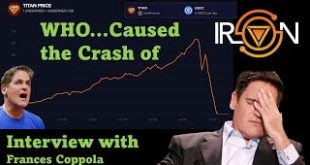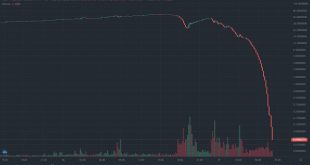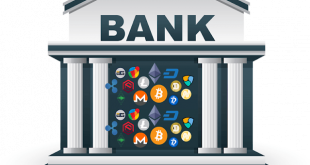It's now widely accepted, though still not universally, that banks create money when they lend. But it seems to be much less widely known that they also create money when they spend. I don't just mean when they buy securities, which is rightly regarded as simply another form of lending. I mean when they buy what is now colloquially known as "stuff". Computers, for example. Or coffee machines. Imagine that a major bank - JP Morgan, for example - wants to buy a new coffee machine for one of...
Read More »Algorithmic stablecoins and regulation with Frances Coppola (Part 2) – Episode 20
In this episode Cas and I are joined by Frances Coppola to discuss fiat backed stablecoins, algorithmic stablecoins, and how the regulations are likely to change to handle both of these. Read more: https://cryptocriticscorner.com/2021/08/06/episode-20---algorithmic-stablecoins-and-regulation-with-frances-coppola-part-2/
Read More »Inflation, deflation, and stablecoins with Frances Coppola (Part 1) – Episode 19
Read more here: https://cryptocriticscorner.com/2021/08/02/episode-19---inflation-deflation-and-stablecoins-with-frances-coppola
Read More »Who & What caused the Titan Finance and Iron "Stablecoin" Collapse. With Frances Coppola
#Titan #Iron #Titanfinance The Iron "stablecoin" which was 75% backed by USDC and 25% backed by the native token Titan lost its peg and due to a collapse in the value of the Titan price with it going to zero. Huge sums of money were lost in an instant and many different theories have been thrown around about what happened and who caused the crash. We talk to Frances Coppola to find out what likely went on behind the scenes. Most People Do Not Click this Link...
Read More »Crypto’s Weimar
A cryptocurrency has just re-enacted the Weimar hyperinflation.Yesterday, the price of the cryptocurrency TITAN crashed to zero, and its related stablecoin IRON fell off its USD peg, trading as low as 69 cents to the dollar. It was a sudden and dramatic collapse that left investors shocked and bewildered. Equally shocked and confused, the coins' issuer launched an immediate investigation: Iron Finance issued its post mortem a few hours later. This is the key paragraph:Later, at around 3pm...
Read More »Bank capital and cryptocurrencies
The BIS's draft proposals for capital regulation of stablecoins and cryptocurrencies have just been released. The headline proposal was a risk weighting of 1250% for what the BIS called "Group 2 cryptoassets", which includes all cryptocurrencies, all algorithmic stablecoins, and reserved stablecoins that don't meet the capital, liquidity and disclosure requirements for "Group 1 cryptoassets" specified in the same document. Bitcoin and Ethereum, the two major cryptocurrencies, would fall...
Read More »Itchy & Scratchy – 21 Million Fractional Math for Frances Coppola
USDT Everything You Need to Know about Tether with Frances Coppola
USDT Tether have to report assets to the New York Attorney General today. We chat to former banker, economist, author and all around lovely lady, Frances Coppola( @frances_coppola ) about the issues surrounding Tethers asset portfolio and what the wider implications of the Crypto markets reliance on USDT and how a run on Tether would play out. Teter Teher USTD UTSD $USDT 0:00 Intro 0:33 Brief History 1:09 How USTD was meant to be 3:41 Issue with reserves 13:24 The role of exchanges 16:31...
Read More »Tether’s smoke and mirrors
Tether has issued what it calls a “breakdown of its reserves”. It actually consists of two pie charts. Here they are:Seriously, this is all Tether has seen fit to reveal. Furthermore, the pie charts only purport to show the breakdown of Tether’s reserves on the 31st March 2021. We do not know whether Tether’s reserves still have the same composition now. Nonetheless, the crypto world took these charts as an indication that Tether was, if not fully cash-backed, at least mostly. “76% of its...
Read More »Calculus for Economists
Gabriel Sterne complains about economists' loose use of mathematical terminology: Of course, it's not just economists who use "increase" and "accelerate" interchangeably. But economics is a mathematical discipline, and in mathematics, "increase" and "accelerate" mean different things. So is Gabriel's observation true, and if it is, is it a problem?To test Gabriel's hypothesis, I ran a little Twitter test. I asked this question: This was of course far from rigorous: the sample was...
Read More » Francis Coppola
Francis Coppola









